#fandom studies
Text
"Oh what a night" – The case of the BBC Sherlock transmasc aesthetics: Relating to problematic masculinities in search for identity
So I sat down and rewrote this silly essay I wrote one day after returning from my trip to the US. Flaneurism at its best (or at its worst, idk). Please bear with me but definitely send in your feedback if you read and feel like it, it means the world to me and it will definitely help me unpack some of my problematicness! Thank you <3
I take a deep drag of my American Spirit cigarette whilst the tail ofmy long black coat swishes behind me dramatically. Dusk-time Boston is lit up. The skyscrapers towering over my tiny figure are glittering against the dark through the blurry lens of my camera phone.
I am consciously imitating the aesthetic of the modern but also always Victorian BBC Sherlock, in the scene following John and Mary’s wedding, in which the world’s only consulting detective surrenders to his noble, quiet pining for his not-gay best friend.
What even is masculinity, anyway? What would I like it to be?
The creators of the series, Gatiss and Moffat, spent 10 years religiously denying the possibility of a romantic or sexual relationship between the two protagonists, while driving the hordes of fans into delirium every time that Sherlock (Benedict Cumberbatch) and John (Martin Freeman) made love with their eyes or confessed their devotion to one another. Despite the queerbaiting, the homophobia and the sexism in the Moftis series, despite the 4th season fiasco, despite the actors denying the possibility of their characters ever running together into the sunset, Sherlock himself never denied being queer. Gay, asexual, demisexual, the interpretations are many, a breath of representation in the relative democracy of fandom. And as if that wasn’t enough, Sherlock and John end up canonically raising John’s daughter together at their 221B Baker Street apartment.
The modernized urban Victorian aesthetic, the provocatively coded dialogues, the deep homosociality, and the simple, pure bitterness towards the creators, renders the community of Johnlock fans more alive than ever almost 10 years after the series’ finale. In some hidden, bright corners of the internet, like fanfiction.net and archiveofourown.com, women and queers publish analyses and fanfiction in which they explore the endless galaxy of human genders, sexualities, and forms of kinship, writing the insufferably British male characters as women, non-binary, FTM, Alpha and Omega, pregnant, high, and always together - two human animals exploring bodies and experiences that belong to us in the shelter of Baker Street, with their landlady, Mrs. Hudson, being their most ardent shipper. We write entire full-length novels for free, with our sole motive being the exploration, the practice in writing, and the communication with other queers, other women, other people who feel like us and live in different sides of the earth which, despite Sherlock not remembering, keeps on orbiting the sun with the certainty born by a Johnlocker for their OTP being endgame.
Back to Boston now, which looks like Glasgow on steroids, with its red brick buildings and the glass towers that pierce the skies - it doesn’t feel as cozy and familiar to me as European cities, but it is big enough to swallow and hide me, safely, away from the suffocating and often murderous, homotransphobic gaze of my motherland, Greece. Boston feels big enough to make me feel free, invisible, and at the same time more visible than ever.
Here’s how I made it happen: in the name of an egotistical but seductive flaneurism, in the idea that here I can be non-binary and roaming the streets while smoking without thinking that, at any given moment, I might be spotted by the people from whom I’m hiding both facts, I end up romanticizing a stroll on stolen land, as well as the tar in my lungs. I feel the need to wander around, heavily perfumed, with a hanful of product in my hair, dressed androgynously in a way that my mother only accepts because she doesn’t understand the meaning of it, smoking as the soundtrack of Frankie Valli & The Four Seasons’ December 1963 (Oh What a Night) blasts through my old headphones. As a queer person living in Greece, I never felt that the streets belonged to me. I’ve always felt like a pariah looking for somewhere to belong to, and the irony of going after that feeling in America as a white European tourist brings a certain sourness to my mouth. Is that how Columbus felt? Was he a sissy who didn’t feel accepted by his mum in their suffocating mediterranean society? No, fuck that thought. Fuck that circle, fuck everything I've been taught by the writers of history. I decide to leave these streets to their people, without it meaning that I’ve suddenly found the courage to reclaim my own back in motherland.
Exhaustion, flight, cowardice? Survival.
Later I will learn that the American Spirits with the Native American on their turquoise box are anything but native-owned. What’s certain is that, in this trip, I found solace while smoking stolen land.
What does that make me? A citizen of the world?
After all, in the entire trip, I pretend I’m Sherlock, the whitest man to ever white man. It’s not as if I don’t have my own personality - at least I hope that I do. It is that through relating (to fictional characters, actors, role models who remind me of an aesthetic I had to build from scratch for my trans self, with the help of other queer people who created fanart or fanfiction, moulding new arhetypes) I find a vehicle for the exploration of my existence more easily, I see my reflection (or the one I’d like to have) in the mirror. In the fandom nobody tells you how to imagine your favourite characters and how not to. Nobody tells you how to write yourself, and nobody blames you for doing it. You create with self-indulgence, and you’re applauded for it. And that saved my life.
For years I related to a genderfluid Tonks, a trans Remus Lupin, a fanon Jean Prouvaire from Les Mis. Through all those experimentations and games, the changing of clothes in the dark, the opening and closing of the closet door, I found a name for myself: Sam. And Sam, like every other trans masculinity with the name Sam, Skye, Noah, and Eliott, contains multitudes.
For the timebeing, my persona of choice is that of Sherlock, perhaps the most insufferable (and one of the most privileged) characters in the history of British TV (which says a lot). “What do you have in common with that emotionally constipated man?” you ask me because you know that my own sentiments are constantly dancing naked before me. I wonder why that is. Indeed, what do I have in common with that guy and end up projecting so much on him? Me, who hesitates to even cancel a doctor’s appointment in pursuit of constant politeness and people-pleasing (AFAB, you see).
When Sherlock’s landlady, Mrs. Hudson, disapproves of his manners and threatens him with a tete-a-tete with his mother, Sherlock gives her his blessing, saying: “You can if you like, she understands very little”.
Sherlock and his turbulent relationship to his parents. Sherlock who always observes everything while staying outside, because he doesn’t know how to get in. Sherlock, always so different that he’s used to people laughing at him, gaping at him with awe, or wanting to punch him in the face. Sherlock who always attracts attention simply because he functions the way he functions, constantly failing to be a normal human being. Neurodivergent Sherlock, camp Sherlock, forgotten-in-another-era, flaneur Sherlock, who even in the Gatiss series (especially in the Gatiss series) is desperate to love, but he never manages to get it right. And finally, Sherlock the logical, the detached, the cynic: masculine elements that I never managed - and was never allowed to - acquire, and which I desperately, problematically craved, because in society and inside me they have been coded as masc.
I am the opposite Sherlock, and that makes me even more of a Sherlock, I decide, and if that helps me sleep at night, then so be it, for now.
As Hil Malatino writes in the chapter Fall Out Boy is Trans Culture of his essay Surviving Trans Antagonism: “The boy at the center of a [Fall Out Boy track, brackets mine] is [...] being eminently braggadocious and narcissistic [...]. He’s stationed directly at the center of a completely solipsistic universe. No matter how insufferable this kind of guy is in reality, I would have killed for a fraction of his swaggering self-confidence as a kid” (Malatino 2020, 17).
What even is masculinity, anyway? What would I like it to be?
“Do I look like Sherlock?” I ask you, hopeful and doe-eyed as I prance around in my black suit inside the house while packing for the trip. “Sherlock is gender, you know.”
“Do you really want to know how I see your gender? 100% honest-to-God?” you ask mischievously.
“Yes, I do,” I’m hanging from your lips.
“You are, deep inside your soul, in this tartan robe of yours, Bananas in Pyjamas.”
I think about it. Not exactly Sherlock. I smile though. I see my gender in your words. Goofy, boyish, vintage, loud, sleepy, badly dressed: Me. Headcanon accepted.
If headcanon and fanon - that is, reclaimed - Holmes played by (problematic) Cumberbatch teaches me how to be a boy or a man, then so be it, because I hope that my performance will be filtered, as much as possible, through my “girlish” (though still white) sensibilities. That, and the fact that there is a child inside me who never got to live as an openly, unashamedly neurodivergent, inquisitive little boy. Because there is a masculine side inside me that I must hide every day when I go to work. So I put together a playlist, I put on my scruffy headphones, and I tar my lungs, just a little more, a little longer until I’m able to finally leave my country for good and feel ready to love myself as I am. My coat swishes behind me as I dance alone on the street, invisible among the crowd, yet feeling more visible than ever before.
CITATIONS: Malatino, H. (2020). Trans care, University of Minnesota Press. https://doi.org/10.5749/j.ctv17mrv14
#sherlock holmes#johnlock#bbc sherlock#sherlock#queer#trans#transmasc#greece#sherlock essay#sherlock meta#fan essay#fan meta#autotheory#self indulgent writing#translock#trans sherlock#tw: smoking#hil malatino#queer theory#trans theory#queer studies#trans studies#fandom studies#fan studies
17 notes
·
View notes
Text
Fans' attitudes toward AI-generated works
Irissa Cisternino, a PhD candidate of Stony Brook University, is writing their research on topics related to technology, art and fandom. You can participate by filling out a survey and additionally, signing up for an interview. The survey is expected to last until at least the end of April, those, who signed up for the interview, will be contacted later. You need to be at least 18 years old to participate in either, be able to understand and speak English and identify as a fan.
After the completion of the research, it will be accessible as the dissertation of the researcher. If you have further questions, you can contact Irina Cisternino at [email protected] or Lu-Ann Kozlowsky at [email protected].
13K notes
·
View notes
Text
I wrote this article for my monthly Tolkien fandom studies column, Cultus Dispatches as part of the OTW's "ten things about fandom" challenge for International Fanworks Day. Normally, my Cultus column begins with a gnarly soup of data, and I often don't even know what (if anything!) will come out of analyzing it. This month, due to the relative lack of data, I thought I was giving myself an easy month of writing. I just needed to come up with ten things, right?? Ha! I think this might be the most challenging article I've written for this column to date.
Here are some fun facts I learned while researching these 10 Important Moments in Tolkien Fanfic History:
Tolkien fanfic is older than Star Trek fanfic.
The first known Tolkien fanfic was an alternate-history Sauron redemption fic.
The first Tolkien fanfic archive was a slash archive.
Three out of four archives opened after the LotR films left theaters used the eFiction open-source script.
The first Angbang story was posted in 2002 (though it wasn't called Angbang yet).
Want to know more? Go read the article! And I'd love to hear what I didn't include that you'd add to your own list. (Or if you make your own list, let me know!)
Many, many thanks to all of the people who talked with me about their work for this article and to those involved in the discussion on the SWG Discord's #fandom-studies channel about this topic.
#tolkien fandom history#tolkien#silmarilion#lotr#lord of the rings#the hobbit#fandom studies#fandom history#ifd2024
431 notes
·
View notes
Text
Do you read fanfiction? Are you queer? Well then I’ve got the perfect survey for you!
Hi! I’m a student writing a research paper on the prevalence of queer couples and lgbtq+ representation in fanfiction and need participants for my survey. This project will be entered in a national Norwegian research competition and will be judged by an academic jury. The more answers I get on this survey, the more accurate my research will be, so I'd really appreciate it if you would take the time to answer!
https://forms.gle/Tcoafs9dU627PNcn8
The survey is now closed! Thank you to everyone who participated!
Now, some of you might be thinking “Hey, I’ve seen this survey before.” And you’d be correct. I have a full explanation as to why here [https://at.tumblr.com/mariathechosen1/queer-participation-and-representation-in/i689fhq3b2vn], but the short explanation is that the original survey was meant for a much smaller sample size and after getting 8000 (!!!) answers on the past survey we decided we had to redo it in proper compliance with the GDPR. If you have any questions about this decision, or about the past survey, please read the FAQ post before contacting me or the project supervisor.
In contrary to the former survey, this research is specifically aimed at queer individuals who read and/or write fanfiction. Both people who answered and didn’t answer the last survey may answer this one.
Here are some reasons to participate:
Science and stuff
Force a highly prestigious academic jury to read more than 20 pages about gay fanfiction
Better my chances of winning real-life money by writing more than 20 pages about gay fanfiction
Help expand a largely ignored academic field (fandom studies)
It’ll only take like 8 minutes (5 minutes if you’re quick)
Uhhmmm…
Please?
#fanfiction#survey#fandom survey#wlw#mlm#lgbtq#lgbt#ao3#bisexual#signal boost#writeblr#transgender#polls#lesbian#gay#academia#queer#writers on tumblr#fandom studies#queerficsurvey#<---- please block this tag if you feel this post is a obstructing a tags page in any way
3K notes
·
View notes
Text
Moral purity and imaginative resistance as influencing factors in fandom 'anti' attitudes
Jessica Black et al.'s 2019 experiment on the correlation between enjoying dark/villainous characters, personal morality and purity beliefs, and imaginative resistance is so interesting when applying it to anti culture and fandom.
They created a Dark Character Scale where participants self-selected how strongly in agreement or disagreement they were with a series of statements about dark or villainous fictional characters. Some of these questions were the following:
"I enjoy films and books that feature main characters that choose morally questionable actions."
"I can often understand where the bad guys in fiction are coming from."
"My favourite fictional characters are morally ambiguous and often do horrible things."
They then utilised the Moral Foundations Questionnaire (Graham et al. 2011) to see what participants considered important when deciding on whether something is morally right or wrong, for example:
Whether or not someone suffers emotionally
Whether or not someone did something disgusting*
Whether or not someone was cruel
Whether or not someone was denied [their] rights
Whether or not someone acted in a way God would approve of*
as well as how strongly participants agreed or disagreed with statements such as:
Compassion for those who are suffering is the most crucial virtue
People should not do things that are disgusting, even if no one is harmed*
It can never be right to kill a human being
I would call some acts wrong on the grounds that they are unnatural*
Respect for authority is something all children need to learn.
One of the final scales participants used was the Black & Barnes (2017) Imaginative Resistance Scale. This is basically used to gauge how resistant the reader is to enjoying or consuming fictional content that contains characters, situations, or worldbuilding that they personally find morally disagreeable. They had to select how strongly they agreed/disagreed with questions like:
Reading books where bad things are depicted as morally acceptable makes me feel dirty
I just can't go along with a story when it violates my beliefs about morality
At times it feels like the author of a book is asking me to endorse actions that I know are wrong
Some things just shouldn't be done, even within a book
I sometimes cannot go along with a story when the "good" characters do morally reprehensible things
Sympathising with immoral characters makes me feel immoral myself.
Unsurprisingly, analysis of the data revealed that there was a strong correlation between disliking or not enjoying dark fictional characters or villains and having a higher purity morality score and more imaginative resistance.
They performed this test in three studies done on three completely different demographics - the first being mostly liberal women from social media sites, the second being mostly younger conservative college undergrads, and the third being adults split 50/50 in gender recruited from MTurk. All three studies showed that having stronger imaginative resistance and higher purity morality scores is directly linked to a lower score on the DCS - meaning that they would like or enjoy dark fictional characters and their actions less.
This tracks pretty well with what can be seen in the emerging anti culture within fandom:
Self-identified 'antis' are likely to agree strongly with the statements from the Imaginative Resistance Scale, and are more likely to score highly on the questions in Moral Foundations Questionnaire that are specifically demarcated as being concerned with purity (marked above with an asterisk *). This means that they are also, according to these studies, much more likely to disagree with dark fictional characters and their actions.
There is also a very interesting point in one of the discussions areas where Black et al. state "It is worth reiterating that the participants in Study 2 tended to be more conservative, and therefore potentially more likely to have greater concerns about moral purity" which tracks with what people in fandom have been saying about antis parroting conservative/puritan talking points and arguments.
What I find the most interesting is the following statement:
"However, moral purity and imaginative resistance are consistently positively correlated, both in the current studies and in prior research ... and are both likely to reflect a fear of moral contagion that would discourage people from identifying with and liking [dark fictional characters]."
This, when applied to antis, suggests that antis may harbor the subconscious belief that enjoying dark fictional content, and therefore being a 'proshipper', is literally psychically contagious. They may view this as some kind of moral disease which is spreading and infecting fandom, which could explain why they are so vehemently against it - fear. This is the puritan Moral Panic all over again.
Black et al. also discuss theories of fictional engagement and parasocial relationships/identification, and whether these studies is relevant to "when and for whom fictional engagement could have the potential to negatively affect real world attitudes or behaviour".
Jessica Black and Jennifer Barnes often publish articles together and have some incredibly interesting reading of morality and fiction that I'd be interested to see applied to fandom and anti culture in an academic setting. Perhaps some people in the field like Samantha Aburime (@rainystudios) are already looking into it - and I'm hoping I can do the same in my studies.
264 notes
·
View notes
Text
Edit (29/09/23): This is now closed but THANK YOU SO SO MUCH to everyone who took the time to interact, like, reblog, share, and respond!!! I really appreciate it 💕🤧
Did you make goncharov (1973) content? Well then i've got the perfect survey for you :)
Hey! I'm a library & information science masters student writing my disso on the information creation process of goncharov (1973) and need participants for a survey.
Here are some reasons to participate:
Because it's Goncharov (1973)
Because surveys are fun
Force my university to read approx 20k on our gay little film which I bet none of them have even seen!!
Shouldn't take more than 10 minutes (5 if you're quick)
Help expand a widely ignored academic domain (fan studies)
Please??
The only requirements are that you're 18 or older and have made some kind of Goncharov (1973) content - even if it's just one meta post about Mr JWHJ0715. The survey is completely anonymous and does not collect your IP address.
Link to the survey:
Please add as much detail as possible. Reblogs are loved and appreciated <3
#goncharov (1973)#gonchorav#mlm#wlw#gradblr#poll#polls#tumblr survey#fandom studies#fandom survey#librarians#libraries
284 notes
·
View notes
Text
Hat jemand von Euch Lust sich wissenschaftlich mit Fanfiction & deren aneignenden Potential zu beschäftigen, u.a. konkret mit Schoethe?
An diesem Workshop der Goethe-Uni Frankfurt zur akademischen Arbeit mit Fanfiction könnt ihr auch über Zoom teilnehmen! Ich gebe den Zugangslink bei Interesse weiter und würde mich freuen <3
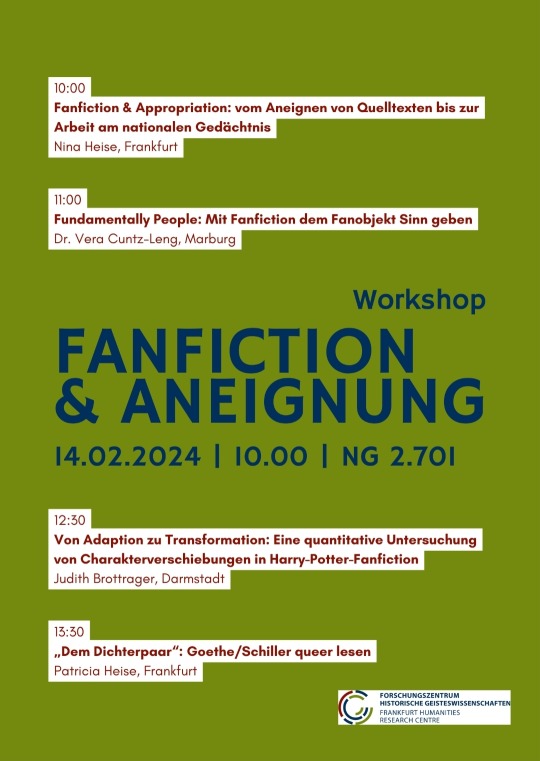
132 notes
·
View notes
Text
So Our Flag Means Death is an international fandom, but let's look at how many non-English fics there are!
(Turns out it's not just Anglos in this fandom??? Sounds fake :p)
Russian 422
Spanish 115
Ukrainian 71
French 69
Chinese 62
Italian 22
Japanese 22
Brazilian Portuguese 12
Polish 10
Czech 9
Finnish 5
Vietnamese 5
Dutch 3
Belarusian 2
German 2
Farsi 2
Catalan 1
Welsh 1
Estonian 1 - Art, but the notes are in English, so presumably mistagged
Filipino 1
Swedish 1
AO3 allows you to tag a lot of different languages, so there are still plenty of languages that have NO FIC. So, if you know a non-English language, go for it! You never know if someone else in fandom knows that language.
95 notes
·
View notes
Text
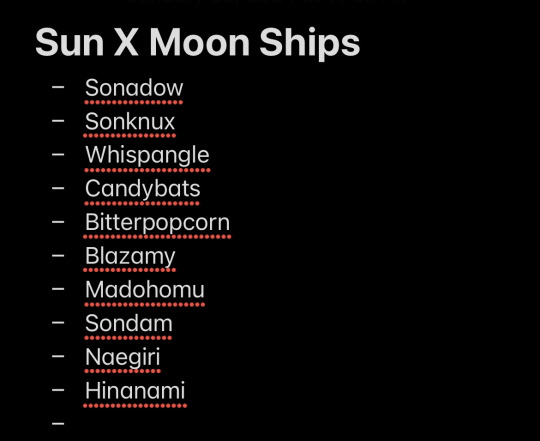
What are some good sun X moon ships that come to mind for you all?
#fandom anthropology#fandom studies#lime talks#fandom analysis#fandom study#fandom#fandom history#fandoms#shipping#Sonadow#sonknux#blazamy#Whispangle#Candybats#bitterpopcorn#Madohomu#sondam#hinanami#naegiri#sun x moon#Sun and moon#sun and moon dynamic
57 notes
·
View notes
Text
Let's Learn About Mental Illness and Fandom!
ETA: This survey has now closed. Thank you for so many more responses than I expected! I will announce as soon as the data is available to others to use and as I make my own discoveries in working with it.
Thank you so much everyone for your responses to my fanfiction and mental illness survey. As of posting we have 108 responses which is fantastic and very much enough for my own thesis, but I don't just want this data to be for me - I want it to be available to other fan studies researchers to work with and build upon.
This is the work I spoke about when I was on the @fansplaining podcast just a few months ago, and something that we just don't have in the fan stats community - our only related information is on whump, which whilst useful isn't by any means the same thing.
So if you'd like to help us learn more about how we read, write and interact with fanfiction about mental illness, please take the survey & share this post!
The survey will take you just 5-15 minutes, and will help to gather groundbreaking insights for fan studies. You’ll be asked about yourself, about how you read, write and find fanfiction about mental illness, and what interacting with this kind of fanfic has been like for you.
Full data on the study, including consent, privacy and GDPR information, can be found on the survey page.
Submissions will remain open until the 25th June 2023. Thank you so much!
#fan studies#fandom studies#fanfic#fandom research#fanfiction#fandom#fandom stats#phdresearch#mental illness#mad studies#fanstats#fandom meta#fandom culture#fandom history#a03#mental health#fanfics
211 notes
·
View notes
Text
Turns out the final update on daily number of new single chapter fics under the OFMD tag on AO3 wasn’t the final update after all! Here's the current situation, 3 weeks after the finale of S2.
Currently the total number of new fics during the observation period in 2023 is 2.3% more than the previous year.
The highest daily number is 102 fics on the day the finale of S2 aired (26 Oct 2023).
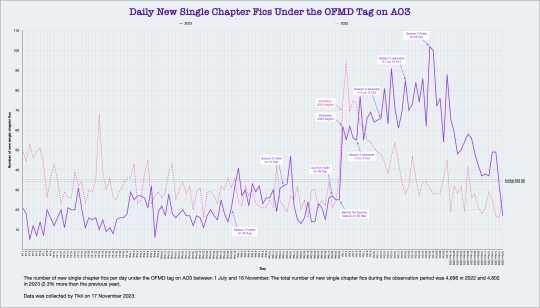
75 notes
·
View notes
Text


These excerpts are from Damien Hagen’s “Regeneration and trans possibility in Doctor Who,” which was published in the most recent issue of Transformative Works and Cultures, OTW’s open access journal. It’s free to read… here (click the button that says HTML)!
Here’s what the editors of the issue had to say:
“Damien Hagen focuses on Doctor Who fandom and the way in which the Doctor's regenerative capacity provides the means for queer and trans fans to explore trans possibilities and gender euphoria. Long before the Doctor's ability to change genders became canon in Doctor Who in 2018 with Jodie Whittaker's Doctor, trans fans have been drawn to the series for its emphasis on changeability, malleability, and bodily fluidity. Through an autoethnographic lens, Hagen argues that Doctor Who can be read as a trans media object—one that is not necessarily explicitly transgender but instead opens up gendered possibilities in which trans fans can imagine otherwise. Hagen further draws on other trans fans' queer and trans readings of a variety of canonical moments in Doctor Who to argue that the ephemerality and liminality of the series can be particularly pleasurable and gender affirming for trans and nonbinary fans who are undertaking their own processes of regeneration. While the series might never have been intended as a trans narrative, Hagen argues that through fannish interpretations and queer readings, it has the potential to provide a mechanism for survival, self-love, and gender euphoria.”
In the plainest terms, Hagen discusses his own/other trans fans’ experiences with Doctor Who as a tool to understand and love their transness. Themes of the show that trans people may relate to include:
Emphasis on change as a good thing (and lifesaving).
Carrying previous selves into the future, loving previous bodies and selves.
The specific experience of ‘creating’ a new body (the Doctor’s ability to regenerate), acceptance of/excitement about those bodies from oneself/others.
Doctor Who, Hagen argues, is a “trans media object,” or a piece of media that may not have explicitly trans characters but allows viewers to see transness reflected in other ways. For instance, when the Doctor and other characters accept their new body, it can feel affirming to a trans viewer who is also navigating the experience of a changing body. Hagen writes, “The regenerations weren't about gender, but my nascent transness felt them as such.”
Do you have a similar experience with Doctor Who? Or are there other media you have felt similarly about?
-Lianne
#fanhackers#fan studies#gender#fandom studies#doctor who#transformative works#transgender#trans studies#author: lianne
557 notes
·
View notes
Text
New Woman Fiction, Supernatural Femslash, and Reading Women's Writing: how useful is the ‘wave’ framework for forming histories of women’s political activism in modern Britain?
Abstract: While scholarship around women’s writing has grown significantly in recent years with the rise of gender studies, historical studies of women’s fiction as a form of political activism are still lacking. This essay aims to address this gap in the literature through critically evaluating the helpfulness of the wave framework when used to re-assess New Woman fiction of the 1890s and Supernatural femslash fanfiction of the 2020s as women’s political fiction, in particular reference to George Egerton’s short stories and 'Sapphicnatural' fanfiction about the character Jo Harvelle. Ultimately, I argue that using the wave structure as an analytical framework is an important academic exercise in re-evaluating our understanding of women’s writing, but should be employed alongside wider critiques of feminist historiography and literature.
i wrote an essay! about how sapphicnatural authors are following in the footsteps of the new woman feminist writers of of the 1890s! it's 3.1k and was originally written for a university assignment so is a little limited in scope - but full of interesting fandom studies as well as historical and literary analysis (if i may say so myself). a massive thank you to @kerryweaverlesbian for volunteering to edit this before i handed it in !! of course feel free to let me know what you think of it and, most importantly, enjoy!
#a lot of people said they wanted to read this when i mentioned it a few months ago so here it finally is !!!#MWAH#a little gift from the most absent jo scholar ever#i will be back i will do better...#jo harvelle#supernatural#sapphicnatural#fandom studies#spn essay#jo harvelle meta#spn meta#new woman#ola writes#ola originals#jo daily
39 notes
·
View notes
Text
Binderary is getting me off my butt to finish my 2023 projects, thank goodness; three volumes finished and four more on their way. This one was just for me: a collection of scholarship and primary sources on fanbinding!
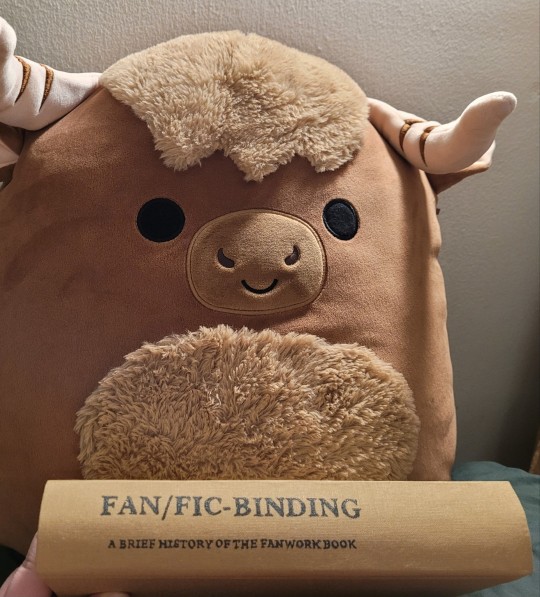
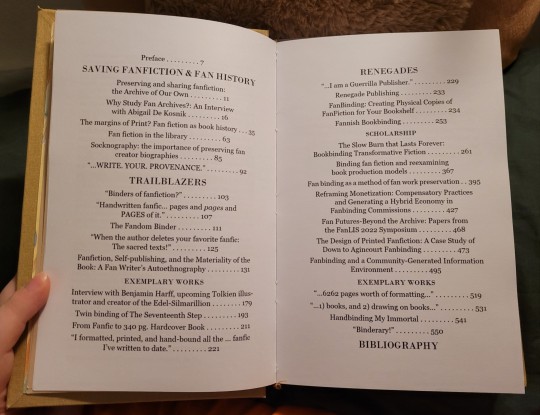
I've been busily writing all over it since I took it out of the press 😂
#i have permission for none of these#but if you're interested in any sources DM me#fanbinding#fandom studies#binderary 2024
30 notes
·
View notes
Text
The response form is now closed! Please do not reblog this post! Thank you to all who signal-boosted!
I have been running an independent archive for over sixteen years now. During that time, I've watched the Silmarillion Writers' Guild go from one archive of many in a crowded field to one of the only independent archives that remains active. Furthermore, the options available to build your own archive have dwindled, leaving fans who want a greater variety of archive choices without much of one.
Last year, I started thinking about how to support the rekindling of independent archives and drafted a tutorial for how to build an archive in Drupal (the platform the SWG uses) that I plan to record this summer. However, this is not the only approach. The recent attention drawn to various issues with the OTW/AO3 has only hastened the importance of fans having the option again of building their own archives.
It's my first day of summer break. I have two months to tackle what I can of this issue, so to get a handle on where people are on the subject and where it's best to focus my energy, I've put together a survey on independent archives.
If you create or read/view fanworks, I want to hear from you! You do not need to have interest in independent archives. Responses are anonymous, and the survey will remain open through 7 July 2023.
You can take the independent archives survey here.
Signal boosts and reblogs are much appreciated so that I can hear from as broad a group of participants as possible.
Going forward, I will be tagging updates related to this work #independent archives.
121 notes
·
View notes
Text
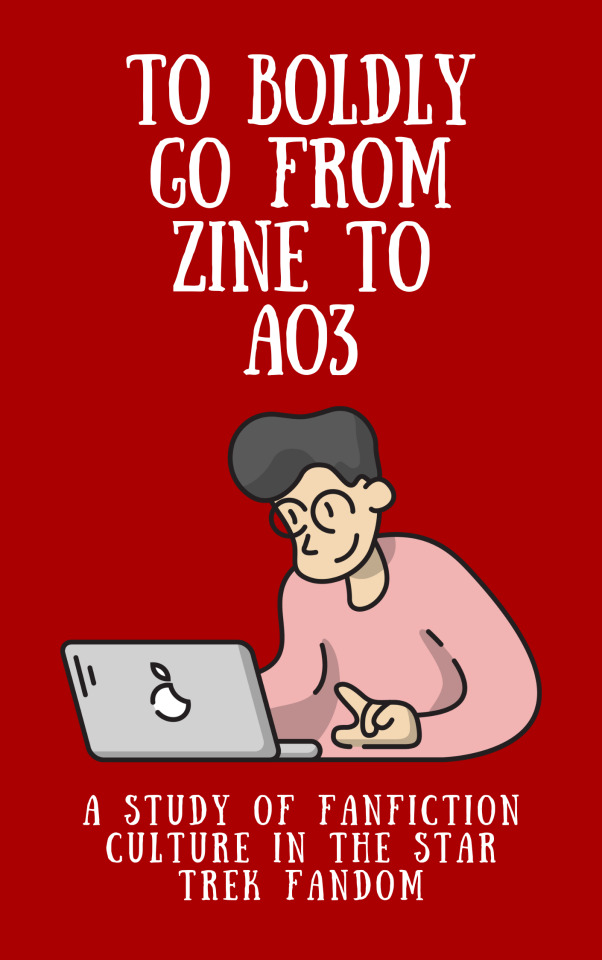
I’m very proud to present my undergraduate thesis:
To Boldly Go From Zine to AO3: A Study of Fanfiction Culture in the Star Trek Fandom
Read it here on AO3!!!
1K notes
·
View notes